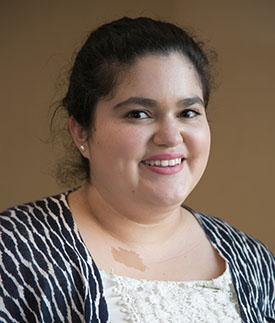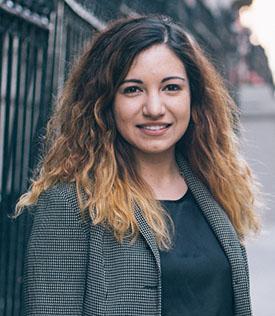Two Columbia Law School Students Selected as Immigrant Justice Corps Fellows
Angelica Juarbe '16 and Erika Vera '16 Will Offer Legal Assistance to Immigrants Fighting Deportation in Partnership with Leading New York City Non-Profits
New York, April 25—Two Columbia Law School students have been named to the third class of Immigrant Justice Corps (IJC) Fellows, the first fellowship program in the United States dedicated to meeting the need for high-quality legal assistance for immigrants seeking citizenship and fighting deportation.
Angelica “Angie” Juarbe ’16 and Erika Vera ’16 follow in the footsteps of Columbia Law School graduates Faiza W. Sayed ’12 and Katherine J. Park ’14, who were part of the inaugural class of fellows selected in 2014. IJC fellowships run for two years and place recent law school and college graduates with New York City’s leading non-profit legal services providers and community-based organizations where they represent immigrants who face a variety of legal challenges, including indefinite detention.
“I am delighted that Angie and Erika were selected to be The Immigrant Justice Corps fellows,” said Ellen Chapnick, Dean for Social Justice Initiatives at the Law School. “It will be an excellent start to their careers as immigration lawyers because it provides excellent training, support and community. Moreover, it recognizes that they already are skilled advocates due to their hard work that took advantage of the opportunities provided by Columbia Law School.”
For Juarbe and Vera, the fellowships are a continuation of work they have been involved in at Columbia Law School. Both have taken advantage of the Law School’s many immigration-related offerings, including the Immigrants’ Rights Clinic led by Professor Elora Mukherjee, which recently joined an amicus brief urging the Ninth U.S. Circuit Court of Appeals to end the detention of mothers and children in federal facilities.
Angelica “Angie” Juarbe ’16
| Angie Juarbe '16, one of this year's Immigrant Justice Corps Fellows, says the needs and vulnerability of immigrants in the U.S. compel her to offer legal assistance to this community. |
As part of her work in the clinic, Juarbe spent several weeks in Dilley, Texas, representing people held in the South Texas Family Residential Center. In August, she won rulings for a 39-year-old woman and her 12-year-old daughter who were released after spending several months in the Dilley facility, one of several clinic victories.
Juarbe, who was born in Puerto Rico and moved with her family to Michigan when she was three, participated in the clinic as a student and as a teaching assistant and Spanish-language interpreter. She also volunteered as a legal advocate in Dilley for the CARA Family Detention Pro Bono Project, and continues to assist on cases there as a remote administrative team leader.
Her other relevant experience includes an externship in the immigration practice at The Bronx Defenders and internships at the immigration law unit at The Legal Aid Society and The Door, a legal and immigration services provider, among other organizations.
Juarbe said she is drawn to the work because of immigrant community’s tremendous needs and vulnerability.
“I can’t imagine what it would take—the conditions, the dangers—to reach the United States to seek asylum,” she said. “And then ultimately to be detained.”
Erika Vera ’16
| Erika Vera ’16, one of this year's Immigrant Justice Corps Fellows, says her experience as a Mexican immigrant in the American South has shaped her interests in immigration and civil rights. (Photo by Nelson Hua) |
Vera, who came to the United States from Mexico when she was six and grew up in Florida and Virginia, has a similarly impressive background. Like Juarbe, she served as a student and Spanish-language interpreter for the Immigrants’ Rights Clinic and as an extern on immigration issues for The Legal Aid Society. She also has worked extensively on labor issues, including as a law clerk at Outten & Golden, where she worked on cases under the Fair Labor Standards Act, and as an extern at the New York State Attorney General’s Office, where she participated in labor abuse investigations. In addition, among other places, she externed in the criminal defense practice at The Bronx Defenders, arguing for clients’ release at arraignments and researching immigration law consequences of criminal charges.
She said her desire to become an advocate stems from her own experience as an immigrant.
“My experiences as a Mexican immigrant in the American South have shaped my interests in immigration and civil rights,” Vera said. “The people I knew had to do a lot of things they did not want to do because they were vulnerable and were not aware of their legal rights.”
Juarbe and Vera have been standouts in many areas at the Law School. Vera served as editor-in-chief of the Columbia Journal of Race and Law, was secretary of the Empowering Women of Color student group, served as a coach for the Native American Law Students Association Moot Court competition, and was a member of the Latino/a Law Students Association.
Juarbe, who was an editor for the Spanish Jailhouse Lawyers’ Manual and the Human Rights Law Review, has been recognized as a Harlan Fiske Stone Scholar for superior achievement in the classroom. She was also president of the Domestic Violence Project, career chair of the Society for Immigrant and Refugee Rights, and a Latino/a Law Students Association Moot Court participant.
The Immigrant Justice Corps was launched in 2014 by Chief Judge Robert Katzmann of the U.S. Court of Appeals for the Second Circuit to address a growing problem in New York City and across the country—inadequate representation. Immigrants have no right to counsel in the United States although studies show that asylum seekers have far greater success when they have attorneys.
Under the supervision of experienced lawyers at host organizations, IJC fellows represent clients with complex cases, including involving naturalization, deportation defense, and affirmative applications for asylum seekers, juveniles, and victims of crime, domestic violence, or human trafficking. They also meet bi-weekly for professional development, skills training, case sharing, and other programmatic activities designed to cultivate a network of well-trained attorneys committed to ensuring access to justice for immigrants.
Columbia Law graduate Rachel Tiven ’03 is executive director of the IJC.
“The IJC is empowering a new generation of leaders in the immigrants’ rights community,” said Mukherjee. “Angie and Erika will be transforming lives as IJC fellows, and I look forward to continuing our work together on behalf of immigrants for years to come.”

